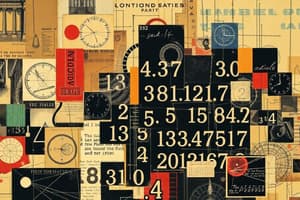Podcast
Questions and Answers
จำนวนที่ไม่สามารถแสดงได้ในรูปของเศษธรรมง่าย คือ?
จำนวนที่ไม่สามารถแสดงได้ในรูปของเศษธรรมง่าย คือ?
- √2 (correct)
- π
- 2
- 3/4
วิธีการจำนวนที่ใช้สำหรับการบวก ลบ คูณ หาร คือ?
วิธีการจำนวนที่ใช้สำหรับการบวก ลบ คูณ หาร คือ?
- Real Number (correct)
- Rational Number
- Integer
- Complex Number
จำนวนที่มีรูปแบบเป็น a + bi เป็น?
จำนวนที่มีรูปแบบเป็น a + bi เป็น?
- -3
- 1/2
- 2 + 3i (correct)
- π
จำนวนเต็มทั้งบวกและลบ เช่น 2, -3 เป็นตัวอย่างของ?
จำนวนเต็มทั้งบวกและลบ เช่น 2, -3 เป็นตัวอย่างของ?
การลบตัวเลขหนึ่งจากตัวเลขอีกตัวเรียกว่าอะไร?
การลบตัวเลขหนึ่งจากตัวเลขอีกตัวเรียกว่าอะไร?
จำนวนเฉพาะหมายถึงอะไร?
จำนวนเฉพาะหมายถึงอะไร?
ระบบเลขฐานสองใช้ทำอะไรในระบบดิจิตอล?
ระบบเลขฐานสองใช้ทำอะไรในระบบดิจิตอล?
ทฤษฎีเลขหมายถึงอะไร?
ทฤษฎีเลขหมายถึงอะไร?
ในคณิตศาสตร์, การคูณหมายถึงอะไร?
ในคณิตศาสตร์, การคูณหมายถึงอะไร?
ในสถาปัตยกรรม, การใช้ตัวเลขมีประโยชน์อย่างไร?
ในสถาปัตยกรรม, การใช้ตัวเลขมีประโยชน์อย่างไร?
Flashcards are hidden until you start studying
Study Notes
Diving into the World of Math: Focus on Numbers
In the vast landscape of mathematics, numbers serve as the foundation upon which we build our understanding, solve problems, and uncover patterns. In this article, we'll explore the world of numbers, delving into their significance, types, and applications in our daily lives.
Number Systems
Numbers come in various forms, and we can categorize them into different systems such as:
- Integer: Whole numbers, positive and negative (e.g., 2, -3)
- Rational Number: Numbers that can be expressed as the quotient of two integers (e.g., 1/2, 3/4)
- Irrational Number: Numbers that cannot be expressed as a simple fraction (e.g., pi, square root of 2)
- Real Number: Includes integers, rational numbers, and irrational numbers
- Complex Number: Pair of real numbers in the form of a + bi, where 'a' and 'b' are real numbers and 'i' is the imaginary unit (e.g., 2 + 3i)
Number Operations
Numbers can be manipulated using four basic operations: addition, subtraction, multiplication, and division. These operations enable us to solve problems, find patterns, and create mathematical models.
- Addition: Combining two or more numbers (e.g., 2 + 3)
- Subtraction: Removing a number from another number (e.g., 5 - 2)
- Multiplication: Scaling numbers by a factor (e.g., 3 × 4)
- Division: Dividing a number by another number (e.g., 12 ÷ 3)
Number Applications
Numbers play a vital role in various fields, including:
- Science: Describing quantities, distances, and measurements in experiments
- Engineering: Calculating forces, stresses, and loads in designs
- Finance: Analyzing investments, calculating profits, and managing debts
- Sports: Measuring distances, speeds, and angles in athletic events
- Art: Describing shapes, colors, and patterns in artistic works
Number Theory
Number theory is a branch of mathematics that deals with the properties of integers. Number theorists study the relationships between numbers and their various properties, such as prime numbers, divisibility, and congruences.
- Prime Number: A natural number greater than 1 that has no positive divisors other than 1 and itself (e.g., 2, 3, 5)
- Congruence: A relation between two numbers modulo a third number, comparing their remainders when divided by that number (e.g., 5 ≡ 1 (mod 2))
Number Systems in Computing
In computer science, numbers are represented in various systems, including:
- Binary: Base 2, used in digital systems to represent 0s and 1s (e.g., 1011)
- Decimal: Base 10, the familiar system we use every day (e.g., 45)
- Octal: Base 8, used in early computer systems (e.g., 17 = 1 × 8^1 + 7 × 8^0 = 1710)
Mastering the world of numbers is an essential step on the path to understanding mathematics and its practical applications. With this knowledge, you'll be well-equipped to tackle problems, make discoveries, and uncover the hidden patterns and beauty of mathematics. So, don't be afraid to dive into the world of numbers and explore the endless possibilities that lie ahead!
Studying That Suits You
Use AI to generate personalized quizzes and flashcards to suit your learning preferences.




